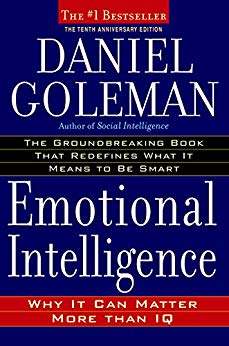

This article is an excerpt from the Shortform summary of "Emotional Intelligence" by Daniel Goleman. Shortform has the world's best summaries of books you should be reading.
Like this article? Sign up for a free trial here .
How is emotional intelligence important in the workplace? What does emotional intelligence have to do with leadership? Learn the top tips on working with a high EQ here.
Many jobs require people to work together, and good teams require harmony between the members and strong leadership.
It takes a lot of top-level teamwork to fly an airplane. When a crash occurs, 80% of the time it’s because of a mistake made by a pilot that could have been prevented if the team had worked together better. Because of this, pilots in training must learn certain social intelligence skills, like open communication, listening, cooperation, and speaking up.
Of course, in everyday jobs, someone making a mistake isn’t going to result in a plane falling out of the sky and potentially killing people–but teams that are poorly managed experience low productivity, an increase in mistakes, missed deadlines, and the loss of team members to other, better workplaces.
Emotional Intelligence and Leadership
Emotional intelligence is particularly important to the leaders in business–CEOs, managers, and the like–and yet these people are usually the biggest believers in cutting emotions out of business.
- One study in the 1970s surveyed 250 executives, and found that most of them thought their jobs required intellect but not emotion, “heads but not hearts.” They thought compassion would directly interfere with their work goals, that they wouldn’t be able to make the necessary decisions without closing themselves off emotionally, and that they wouldn’t be able to deal with their employees if they had to pay attention to their emotions.
The same negative effects we discussed in the Chapter 1 still happen in workplaces: stress and emotional distress make it harder to remember things, learn new things, make decisions, and work together.
Emotional intelligence and leadership shouldn’t be about dominating people, it should be about persuading them to work together for a common goal. An ideal workplace is one where every member is attuned to each other’s feelings, the team can handle disagreements without allowing them to escalate, and each member can get into a flow state while performing their job. To accomplish all that, we need emotional intelligence.
Working in Groups
Many people today are “knowledge workers,” workers who specialize in adding value to knowledge–computer programmers, data analysts, writers, and so on. The productivity of these workers depends on their coordination in an organized team–computer programmers program the software but don’t distribute it, writers write but don’t publish. In other words, they rely on other people to help make the work happen.
Instead of serving as an individual work unit, knowledge workers are part of a team, and the team becomes the work unit. Just as emotional intelligence is important for an individual to navigate work, for a group to do their best work together it’s important for a team to have a collective emotional intelligence (Shortform note: Goleman somewhat confusing refers to this as group IQ, despite it being emotional intelligence).
- And, similar to IQ’s impact on an individual, a group’s average IQ does not determine their success: their average emotional intelligence does.
- Of course, a team can only be as good as the sum of its parts–emotional intelligence won’t compensate for lower IQ or lack of skill. But individual members can be extremely smart, skilled, or talented, and still do poorly in a team. Teams with a high collective emotional IQ will be able to use their individual skills to the greatest success in harmony with each other.
A handful of things can bring down a group’s performance, all of them in the realm of emotional intelligence:
- Overly controlling team members will bring down group performance by being too domineering–teams require a give and take, not a dictator.
- Conversely, overly passive team members will also bring down performance–they might as well be deadweight, not contributing to the group effort.
- Groups with a lot of friction between its members won’t be able to utilize everyone’s skills to the best of their potential.
There are a variety of circumstances in any workplace where group emotional IQ comes into play: meetings, emails, conferences, work teams, and even informal individual networks. Managers or team members looking to improve their group’s IQ should organize some emotional intelligence training, both for themselves and the other members.
Networking and Emotional Intelligence
Even workplaces without organized team efforts still benefit from employees with emotional intelligence.
Individual “stars” at a workplace do something that sets them apart from other employees: they have an informal network of fellow workers they can call on when they need something specific, on account of developing and maintaining personal relationships with these workers.
The formal hierarchy and network at an organization is designed to deal with anticipated problems on the job–but having an informal network of fellow workers becomes more important in the face of unanticipated problems. These informal networks are good in a crisis because they do not have to go through the typical channels, allowing workers to focus on specifically what needs to get done and bypass unnecessary functions.
There are three types of informal networks, based on the type of connection needed.
- Communication networks are based on who talks to whom at work.
- Expertise networks are based on who people go to for advice about certain issues.
- Trust networks are based on who trusts whom.
———End of Preview———

Like what you just read? Read the rest of the world's best summary of Daniel Coleman's "Emotional Intelligence: Why It Can Matter More than IQ" at Shortform . Learn the book's critical concepts in 20 minutes or less .
Here's what you'll find in our full Emotional Intelligence summary :
- What are emotions? Why do we have them?
- What is emotional intelligence? Why is it important?
- How do you manage your own emotions? Anger, anxiety, and sadness?
- How can you approach your relationships with more emotional intelligence?
- How can you teach your children emotional intelligence?
- How can emotional intelligence boost your career?






